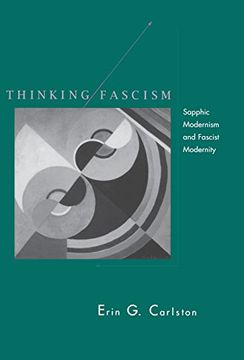Share
Thinking Fascism: Sapphic Modernism and Fascist Modernity (in English)
Erin G. Carlston (Author)
·
Stanford University Press
· Hardcover
Thinking Fascism: Sapphic Modernism and Fascist Modernity (in English) - Erin G. Carlston
$ 100.00
$ 135.71
You save: $ 35.71
Choose the list to add your product or create one New List
✓ Product added successfully to the Wishlist.
Go to My WishlistsIt will be shipped from our warehouse between
Monday, May 06 and
Tuesday, May 07.
You will receive it anywhere in United States between 1 and 3 business days after shipment.
Synopsis "Thinking Fascism: Sapphic Modernism and Fascist Modernity (in English)"
Thinking Fascism analyzes three works by women writers―Djuna Barnes's Nightwood (1936), Marguerite Yourcenar's Denier du rêve (1934), and Virginia Woolf's Three Guineas (1938)―that engage, directly or indirectly, with fascist politics and ideology. Through these analyses, the author explores the conjunction between fascism and other forms of modernity, and refines the discussion about the relationship between women intellectuals and the various aesthetic and ideological practices collected under the names of modernism and facism.Until recently, much theoretical work on fascism has represented fascist thought as radically different from and inimical to non-fascist thought, and feminist criticism has further assumed that women intellectuals―especially the sexually marginal women sometimes grouped as the "Sapphic Modernists"―were necessarily antagonistic to fascist ideologies. In contrast, the author argues that Western intellectuals of both genders and all political persuasions were preoccupied in the 1930's with the commodification of culture and sexuality, the erasure of liberal bourgeois concepts of the individual and the work of art in mass society, and the failure of social institutions to provide transcendence and immediacy in the face of these transformations. By demonstrating that women writers like the Sapphic Modernists and conservative or fascist male modernists often articulated very similar conceptions of these problems, this book suggests that fascism cannot be posed as the absolute other of non- or even anti-fascist politico-cultural discourses in the interwar period.
- 0% (0)
- 0% (0)
- 0% (0)
- 0% (0)
- 0% (0)
All books in our catalog are Original.
The book is written in English.
The binding of this edition is Hardcover.
✓ Producto agregado correctamente al carro, Ir a Pagar.

